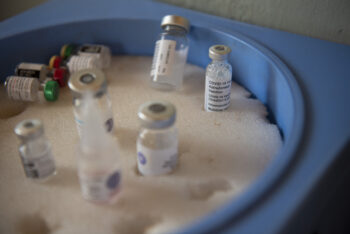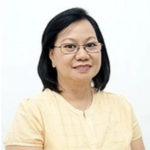
The ACT Alliance Asia-Pacific Regional Forum co-convened an Asia-Pacific Workshop on Vaccine Equity and Hesitancy on the 31st of January of 2022, with strategic partners including UNICEF, the WHO, World Vision International, the National Council of Churches in the Philippines, Pacific Conference of Churches, YAKKUM and CCDB. The workshop was inspired by fruitful exchanges and deep reflections that drew on the wealth of expertise of speakers, moderators and participants across the Asia-Pacific region and beyond such as those highlighted by the ACT Africa Vaccine Workshop. The Asia-Pacific Workshop participants finalized a Declaration drawing on the main messages and themes discussed at the webinar. The full report and recording of the workshop are available through this link. A one-pager about ACT’s work on vaccine equity can be downloaded here.
Unfortunately, COVID-19 vaccine distribution globally has not been as rapid as the virus’ mutation and spread. Most doses of the vaccines have been acquired by and administered in developed countries, meaning the most vulnerable people, especially in developing nations, are yet again being left behind.
If the available vaccine doses had been allocated equitably, all health workers and vulnerable sections of the population could have been covered. And if this system of inequitable access and distribution of vaccines is not addressed now, efforts to control and address the pandemic will become futile.
Global access and equitable distribution remain the best driver in addressing the pandemic, thereby saving lives, increasing immunity, reducing the possibility of new variants and securing economic recovery globally. We need to support the global cry to untangle COVID-19 treatments and technologies, including vaccines, from patents and monopolies that make these life-altering measures exclusive to only a few and result in the suffering of billions of people worldwide.
Our Concerted Action
ACT Alliance is faith-motivated, rights-based, impact focused, and committed to working ecumenically and inter-religiously, with the communities we seek to serve and accompany at the center of our work. This identification of who and what we are is appropriate in addressing the many emerging issues of this pandemic. As further indicated in our Global Strategy and with our current context, we will respond with a holistic and integrated programme guided by the local contexts of the communities we serve through our humanitarian, development and advocacy work.
The COVAX Facility
Now more than ever, it is important to use our prophetic voice in amplifying the calls for an accountable and compassionate response during this state of public health emergency.
We know that COVAX is confronted with many difficulties, particularly the lack of investment, exports constraints, and governments making side deals with the giant pharmaceutical corporations to stake claims on large portions of vaccine supplies.
The representation of our ACT General Secretary to the COVAX Facility, is commendable. He can bring our advocacy issues to that platform, but his is just one voice among many others. We can make that voice stronger by our collective support to the advancement of its purpose.With this pandemic, no one is truly safe and healthy unless all our communities are safe and healthy. This calls for a genuine global solidarity.
Faith Actors’ Role in Ending the Pandemic
Religious leaders and other faith-based actors have an important role to play in addressing the issues of vaccine equity and hesitancy. As already noted by the Christian Conference of Asia consultation held last in July 2021:
“The churches in Asia are placed in better positions to play important roles in building trust towards a healthier world, particularly in crisis situations such as the surge of the pandemic. The myths and misconceptions surrounding the pandemic, especially concerning vaccinations, must be urgently and emphatically addressed with critical priority by Asian churches and other faith communities. The trust that communities have in faith leaders can be instrumental and leveraged to play an important role in restoring health, and ensuring healing and wholeness. Churches must also promote and share correct information with the help of medical professionals about the pandemic. Churches should also engage in facilitating theological reflections on social and moral obligations to each other which will help in eliminating fear, hesitancy, and misinformation regarding vaccines. Church-owned healthcare institutions and services also need to shine a light on, and reach out to, underprivileged populations—the poorest of the poor, the rural communities, the socially marginalised, and those in fragile or conflict-prone areas—striving for their inclusion in vaccination and immunisation campaigns.”
Three major actions identified were culled from the report of that consultation: education; advocacy and direct service.
Education – providing the right message and information to dispel fear, correct misconceptions, language appropriate to the specific population; in so doing the art of listening and conversation is important in order to effectively send the message across; it must be able to bring hope and stir collective action among community members through scientific information, critical analysis and collective reflections. Theological questions must be appropriately addressed.
Advocacy – keeping our firm stand “that there is no lockdown on rights” even during the pandemic. To safeguard the right to health in this public health and economic crisis; emphasize the need for human rights-focused and evidence-based policies to truly solve the problem and that proactive and grounded pandemic response that highlights the respect for basic human rights; and the issue of accountability- that there is an even greater duty from the state to ensure the people’s right to health.
Direct Service – providing appropriate and timely emergency response, especially to those greatly affected by the pandemic; mobilizing available resources and capacity to help alleviate the deplorable condition of the least and marginalized.
We, members of the ACT Alliance must harness the gifts that we have. Our rootedness in the communities– especially the most vulnerable and marginalized communities– puts us in a position to make an impact. Building on the opportunities that we have as a faith-based organization, it is important to increase our understanding and visibility of our distinct role especially in countering inequalities and economic injustice.
Let us share the healing ministry of Christ who “…went throughout Galilee, teaching in their synagogues, proclaiming the good news of the kingdom, and healing every disease and sickness among the people.” (Matthew 4: 23, NIV) that the “…healing ministry is the cornerstone of Jesus Christ’s public ministry. The strategy of Jesus Christ in his ministry provides priority to the people in the periphery of society… He provided sick people with his gift of power and presence that brought about the wholeness of life.” (NCCP Statement)
 Minnie Anne Mata-Calub is the ACT Alliance Vice-Moderator and the Deputy General Secretary of the National Council of Churches in the Philippines
Minnie Anne Mata-Calub is the ACT Alliance Vice-Moderator and the Deputy General Secretary of the National Council of Churches in the Philippines